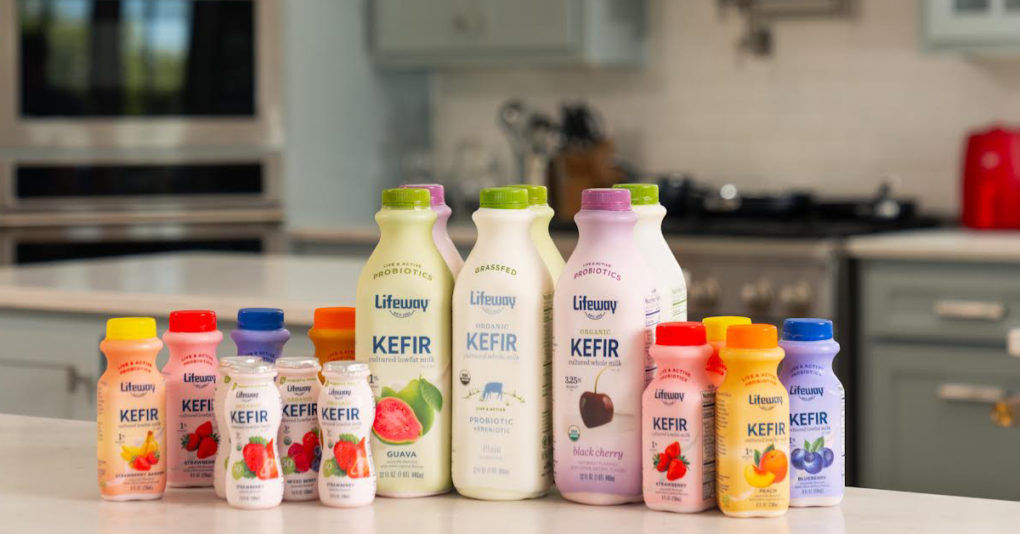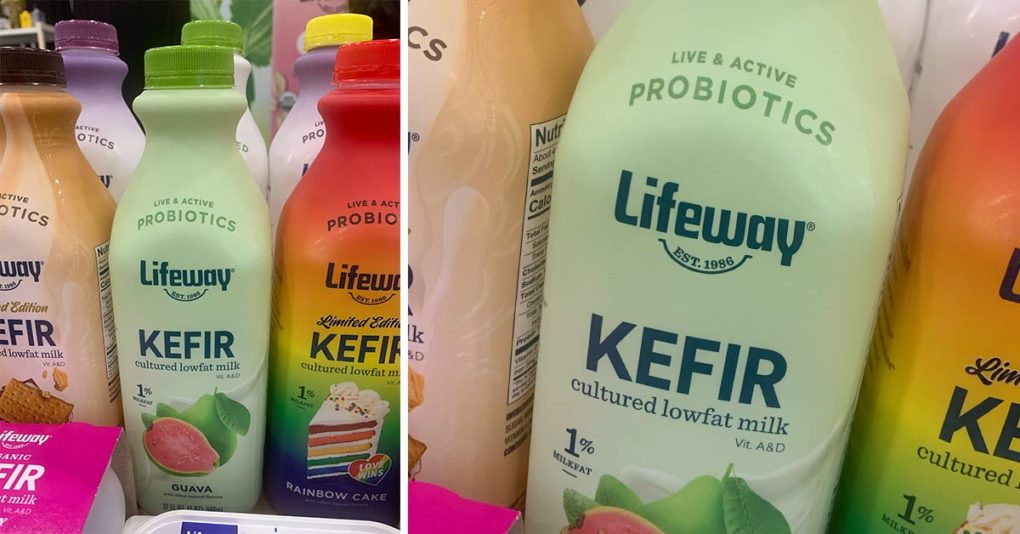In January 2022, having bounced back from a period of major revenue declines and operating losses, leading U.S. kefir manufacturer Lifeway Foods announced a new phase for the decades-old brand dubbed “Lifeway 3.0” with a focus on growth and scaling.
Now, after four straight quarters of record sales growth, Lifeway CEO Julie Smolyansky says the company has met that goal, and is looking to the future with an innovation pipeline of fermented dairy products that could see it reach further beyond its origins in kefir.
Earlier this month, Lifeway reported that net sales in Q1 2024 grew 17.8% to $44.6 million, fueled by strong volume sales, favorable transportation costs and gross margin expansions. The strong start to the year followed 13.1% growth in net sales for FY 2023, bringing in $160.1 million. Those results mark a significant turnaround from five years earlier, when Lifeway was reporting revenue declines of 15% in Q3 2018 with operating losses nearing $600,000.
“We looked inward and decided that we would focus on our core, focus on the users that we know that are in our community and the loyal ambassadors for our brand,” Smolyansky told BevNET in a call this week.
While Smolyansky believes the brand her father founded in 1986 is now riding high – benefiting from broader consumer awareness of gut health and bringing in more mainstream consumers by highlighting kefir’s similarities to yogurt – the road to this moment hasn’t been without its bumps: Facing stiff plant-based competition, Lifeway briefly dabbled in the dairy alternative trend in 2021 with a line called Plantiful, but has since abandoned that line, opting to instead push back against what Smolyansky suggested was misinformation about the health benefits of dairy products.
More painfully, behind-the-scenes the company has been in a two-year long “family feud” involving Smolyansky’s mother and brother, who sought to oust her as CEO and sell the company in 2022, and which has now unspooled into a fresh lawsuit in which Lifeway claims they founded a competing kefir brand as a “practical joke.” A claim her brother Edward Smolyansky denies.
Regardless, Smolyansky is looking ahead, ready to take Lifeway into new channels and new categories, with an innovation pipeline and a marketing message focused on singing the praises of fermented dairy.
Embracing Health and Wellness
Leaning into health and wellness has been a core piece of converting new consumers to kefir, Smolyansky said, with the gut health trend that has reinvigorated categories like soda providing a lift for Lifeway’s probiotic rich dairy products. She suggested that, although the pandemic brought its own challenges in supply and retail disruption, the increased interest in immunity and rising awareness of the gut’s role in overall health helped to lock in the brand’s current growth trajectory.
An active digital and social media presence highlighting these health trends has been part of Lifeway’s strategy.
“I am so excited about this new frontier where people are actually making the connection between their gut health and their overall health and wellness,” Smolyansky said. “And we are helping [consumers] be empowered with this information, from when it starts up in the science and medical labs and it trickles down into scientific news and journals, and then into mainstream media and into your social media feed.”
This wellness focus has also had Lifeway marketing around the fitness community, yoga studios, and gym chains like Barry’s. The company is also seeking to grow its presence in other unconventional channels like hospitality and colleges and universities.
Lifeway is also doing more to assert itself into the cultural mainstream, appearing at concert festivals like Coachella and the upcoming Lollapalooza in August. Last year’s hit Barbie movie also provided a lift for Lifeway, Smolyansky said that the brand got a bump after actress Margot Robbie shared publicly that she began drinking kefir as part of her skin-health routine to achieve her “doll-perfect” look.
“That went viral,” Smolyansky said. “My teen daughters were drinking kefir like crazy after that and all of their friends were drinking it. Things like that really have kind of helped [add] fuel to that fire.”
Though refrigerated kefir remains a relatively smaller category in dairy, Lifeway is by far the leader in the space. According to Circana, in the 52-weeks ending April 21, 2024, Lifeway had an 89.2% dollar share of the entire tracked category – valued at $263.5 million in dollar sales – in MULO and c-store retail. The next largest competitor is private label products, at just 3.7% share, followed by Maple Hill Creamery (1.4%) and plant-based brand Forager Project (1.3%).
New Innovation Ahead
During the pandemic, Lifeway slowed its innovation process, Smolyansky said, as it became difficult to secure additional retail space for new products and “impossible to launch innovation.” That continued throughout the post-pandemic environment as inflation led many consumers to default to pantry essentials when shopping.
The brand also faced headwinds from the plant-based dairy alternative trend, although Smolyansky now feels that more consumers are returning to dairy and retail data suggests sales growth of oat and other plant-based milks have been leveling out: Circana reported sales of oat milk grew just 0.2% in the 52-weeks ending April 21 while the overall plant-based milk category declined -5%.
“There has been so much fluctuation and fickleness of what consumers want,” she said. “Two years ago they wanted oat milk – today they don’t. Today… if they’re drinking dairy again, then they’re looking for premium with grassfed, with organic and we see a huge demand for organic.”
Lifeway itself had introduced its plant-based Plantiful line in 2021, but has now discontinued it in order to go all-in on its original focus of fermented dairy products. Smolyansky suggested that consumers are missing out on health benefits when they embrace “elimination diets” and called out “misinformation” about the attributes of dairy, suggesting probiotic-rich kefir can actually be beneficial for consumers with lactose sensitivities.
“Just because people – let’s say very creative entrepreneurs – want to slap some words on a label, that doesn’t mean that it’s right or accurate,” she said. “I think we need to be very mindful of products that are sitting on the shelf that are mislabeled.”
Lifeway is now looking to turn up its new product output, with flavor being a big focus. One of the brand’s most recent launches has been Guava, which Smolyansky said is aimed at growing Lifeway’s presence in the Hispanic market. The brand has also sought to partner with companies like Telemundo and begun field marketing at Hispanic heritage festivals, while also growing its business in Mexico and states with higher Hispanic populations like California.
Aside from flavor, the brand wants to expand deeper beyond kefir, although it still intends to focus on fermented dairy. Smolyansky said the brand has seen strong sales for its Farmer’s Cheese product, and although she didn’t specify where the company will go next, future innovations could be in food or other dairy beverages.
A Not-So-Funny Family Feud
In 2022, Smolyansky’s mother and brother, Ludmila and Edward Smolyansky – who own over a quarter of Lifeway’s shares – moved to oust their relative from the CEO position she’s held since 2002, install new board members and put the company up for sale. Edward previously served as CFO and COO of the company before exiting in 2022, while Ludmila served on the board up until 2023.
Last June, those efforts were joined by shareholder Kanen Wealth Management, which called for Julie Smolyansky to be replaced, alleging in an open letter that she was an absentee executive and part of an “overpaid” board that had failed to raise Lifeway’s stock price despite growing revenues.
Ultimately, Smolyansky survived the ordeal, but despite various agreements between the shareholders and the company, it has turned out to be an on-again, off-again affair.
“To say that familial relations have become strained over the years is an understatement,” Lifeway wrote in its April court complaint against Ludmila and Edward.
This spring, Ludmila and Edward Smolyansky launched a new, competing kefir business called Pure Culture Organics, debuting a new line of kefirs at Natural Products Expo West 2024 in March. In April, Lifeway sued the startup, alleging misappropriation of trade secrets by “stealing the formula for Lifeway” and Lanham Act violations by falsely claiming to be affiliated with Lifeway, citing a video of a representative for Pure Culture Organic at Expo West telling attendees the brand was part of the “same umbrella.”
But last week, Lifeway amended its lawsuit, claiming it had discovered that Edward Smolyansky started Pure Culture as an elaborate “practical joke” and that the company had no contracts with customers and did not pose a true threat to Lifeway. The company claims that he had lied in text messages to a “senior Lifeway official” where he claimed that “he bought the secret formula from Lifeway’s culture supplier” for a “[t]op secret project.” Ludmila Smolyansky later testified in her deposition that the company was only a “joke” and that it had no contracts with customers or revenue.
A website for Pure Culture Organic features several product descriptions for kefirs with different functional offerings from Lifeway’s portfolio, including a collagen variety, as well as a news and press releases page that mostly contains links to updates and documents regarding the lawsuit.
Lifeway has now dropped its trade secrets claim and its call for a preliminary injunction against Pure Culture Organic, but it is moving ahead with the allegation of false association and is seeking damages, particularly as the company had spent heavily to pursue the lawsuit.
Reached by BevNET, Edward Smolyansky denied that Pure Culture was only a joke and said he has personally invested over $200,000 into the business and fully intends to launch the product this fall. He also denied stealing trade secrets, arguing that his goal is to provide a better, differentiated kefir than Lifeway’s, noting that the kefir Pure Culture is developing will be lactose-free, free of stabilizers and dyes, and will include SKUs with added functional benefits like the collagen variety.
“I’m protecting Lifeway’s flank to show them that competition is around the corner at any notice,” he said.
When asked about the feud, Julie Smolyansky declined to go into details citing the ongoing litigation, but she defended her record as CEO, backed by the current streak of positive quarters.
“The strategy that was announced and the subsequent results kind of speak to themselves,” she said. “I will always do the right thing, and deliver on my promises to my father, and we’ll protect the company and the brand, no matter what.”
“Unfortunately, it’s a common [thing] – not the first family business, not the last family business to experience challenges, but you know, making the best quality Lifeway products is something that I’m passionate about.”


